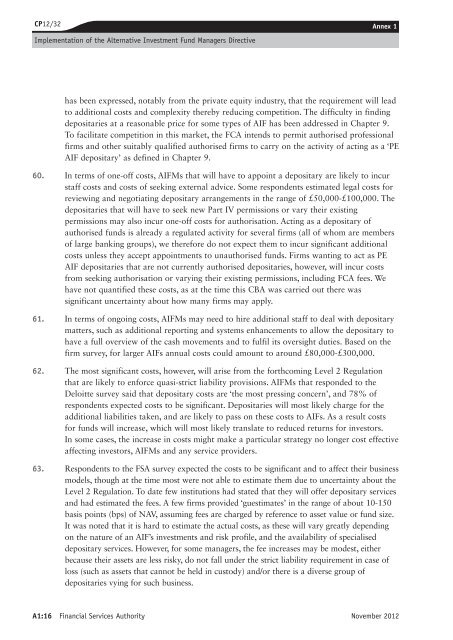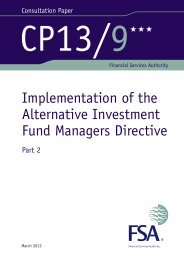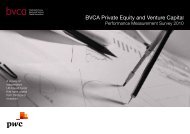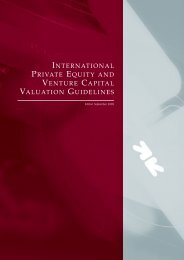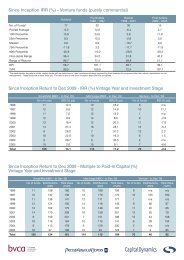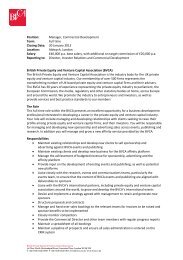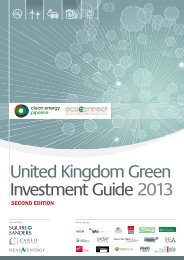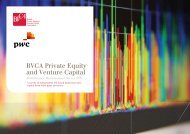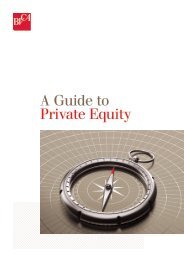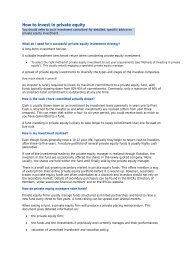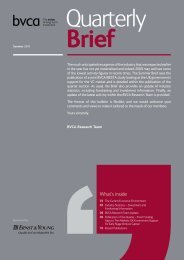CP12/32: Implementation of the Alternative ... - BVCA admin
CP12/32: Implementation of the Alternative ... - BVCA admin
CP12/32: Implementation of the Alternative ... - BVCA admin
Create successful ePaper yourself
Turn your PDF publications into a flip-book with our unique Google optimized e-Paper software.
<strong>CP12</strong>/<strong>32</strong><br />
<strong>Implementation</strong> <strong>of</strong> <strong>the</strong> <strong>Alternative</strong> Investment Fund Managers Directive<br />
Annex 1 X<br />
has been expressed, notably from <strong>the</strong> private equity industry, that <strong>the</strong> requirement will lead<br />
to additional costs and complexity <strong>the</strong>reby reducing competition. The difficulty in finding<br />
depositaries at a reasonable price for some types <strong>of</strong> AIF has been addressed in Chapter 9.<br />
To facilitate competition in this market, <strong>the</strong> FCA intends to permit authorised pr<strong>of</strong>essional<br />
firms and o<strong>the</strong>r suitably qualified authorised firms to carry on <strong>the</strong> activity <strong>of</strong> acting as a ‘PE<br />
AIF depositary’ as defined in Chapter 9.<br />
60. In terms <strong>of</strong> one-<strong>of</strong>f costs, AIFMs that will have to appoint a depositary are likely to incur<br />
staff costs and costs <strong>of</strong> seeking external advice. Some respondents estimated legal costs for<br />
reviewing and negotiating depositary arrangements in <strong>the</strong> range <strong>of</strong> £50,000-£100,000. The<br />
depositaries that will have to seek new Part IV permissions or vary <strong>the</strong>ir existing<br />
permissions may also incur one-<strong>of</strong>f costs for authorisation. Acting as a depositary <strong>of</strong><br />
authorised funds is already a regulated activity for several firms (all <strong>of</strong> whom are members<br />
<strong>of</strong> large banking groups), we <strong>the</strong>refore do not expect <strong>the</strong>m to incur significant additional<br />
costs unless <strong>the</strong>y accept appointments to unauthorised funds. Firms wanting to act as PE<br />
AIF depositaries that are not currently authorised depositaries, however, will incur costs<br />
from seeking authorisation or varying <strong>the</strong>ir existing permissions, including FCA fees. We<br />
have not quantified <strong>the</strong>se costs, as at <strong>the</strong> time this CBA was carried out <strong>the</strong>re was<br />
significant uncertainty about how many firms may apply.<br />
61. In terms <strong>of</strong> ongoing costs, AIFMs may need to hire additional staff to deal with depositary<br />
matters, such as additional reporting and systems enhancements to allow <strong>the</strong> depositary to<br />
have a full overview <strong>of</strong> <strong>the</strong> cash movements and to fulfil its oversight duties. Based on <strong>the</strong><br />
firm survey, for larger AIFs annual costs could amount to around £80,000-£300,000.<br />
62. The most significant costs, however, will arise from <strong>the</strong> forthcoming Level 2 Regulation<br />
that are likely to enforce quasi-strict liability provisions. AIFMs that responded to <strong>the</strong><br />
Deloitte survey said that depositary costs are ‘<strong>the</strong> most pressing concern’, and 78% <strong>of</strong><br />
respondents expected costs to be significant. Depositaries will most likely charge for <strong>the</strong><br />
additional liabilities taken, and are likely to pass on <strong>the</strong>se costs to AIFs. As a result costs<br />
for funds will increase, which will most likely translate to reduced returns for investors.<br />
In some cases, <strong>the</strong> increase in costs might make a particular strategy no longer cost effective<br />
affecting investors, AIFMs and any service providers.<br />
63. Respondents to <strong>the</strong> FSA survey expected <strong>the</strong> costs to be significant and to affect <strong>the</strong>ir business<br />
models, though at <strong>the</strong> time most were not able to estimate <strong>the</strong>m due to uncertainty about <strong>the</strong><br />
Level 2 Regulation. To date few institutions had stated that <strong>the</strong>y will <strong>of</strong>fer depositary services<br />
and had estimated <strong>the</strong> fees. A few firms provided ‘guestimates’ in <strong>the</strong> range <strong>of</strong> about 10-150<br />
basis points (bps) <strong>of</strong> NAV, assuming fees are charged by reference to asset value or fund size.<br />
It was noted that it is hard to estimate <strong>the</strong> actual costs, as <strong>the</strong>se will vary greatly depending<br />
on <strong>the</strong> nature <strong>of</strong> an AIF’s investments and risk pr<strong>of</strong>ile, and <strong>the</strong> availability <strong>of</strong> specialised<br />
depositary services. However, for some managers, <strong>the</strong> fee increases may be modest, ei<strong>the</strong>r<br />
because <strong>the</strong>ir assets are less risky, do not fall under <strong>the</strong> strict liability requirement in case <strong>of</strong><br />
loss (such as assets that cannot be held in custody) and/or <strong>the</strong>re is a diverse group <strong>of</strong><br />
depositaries vying for such business.<br />
A1:16 Financial Services Authority November 2012


